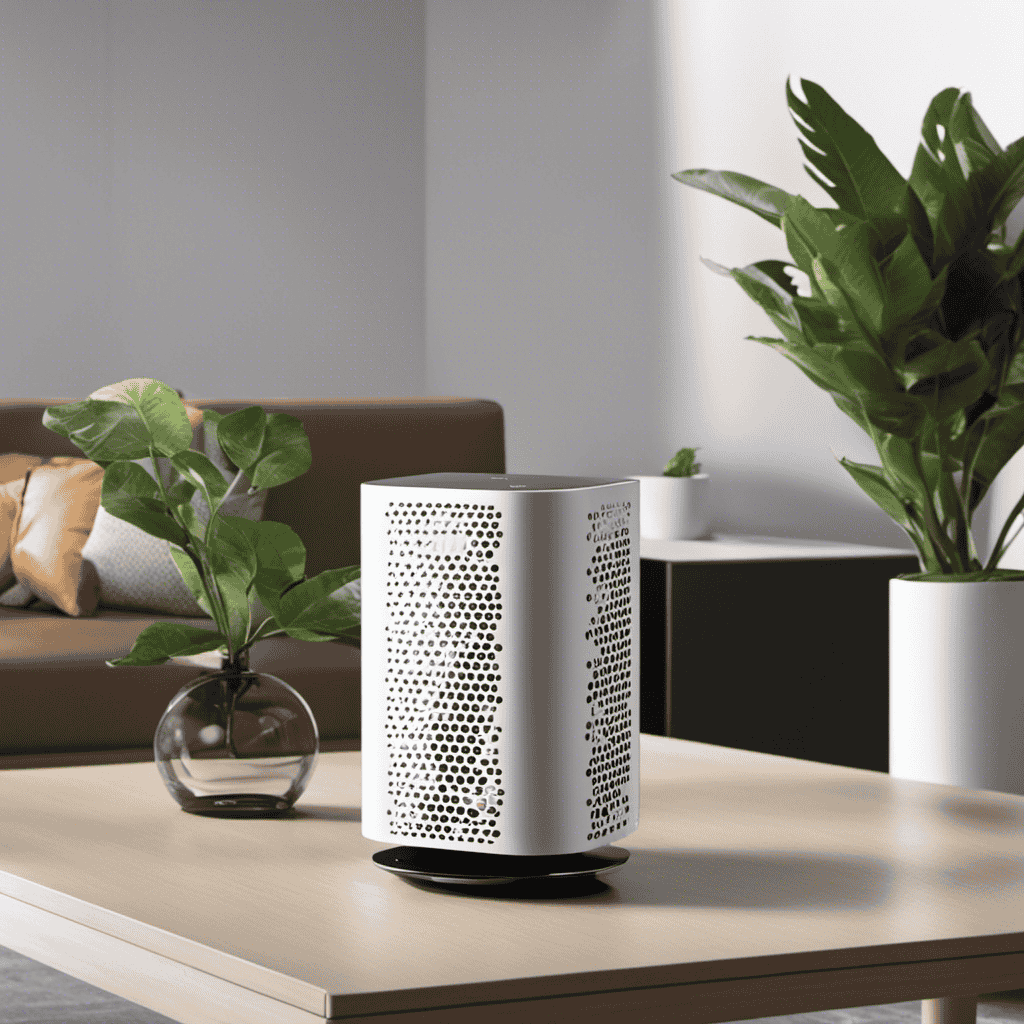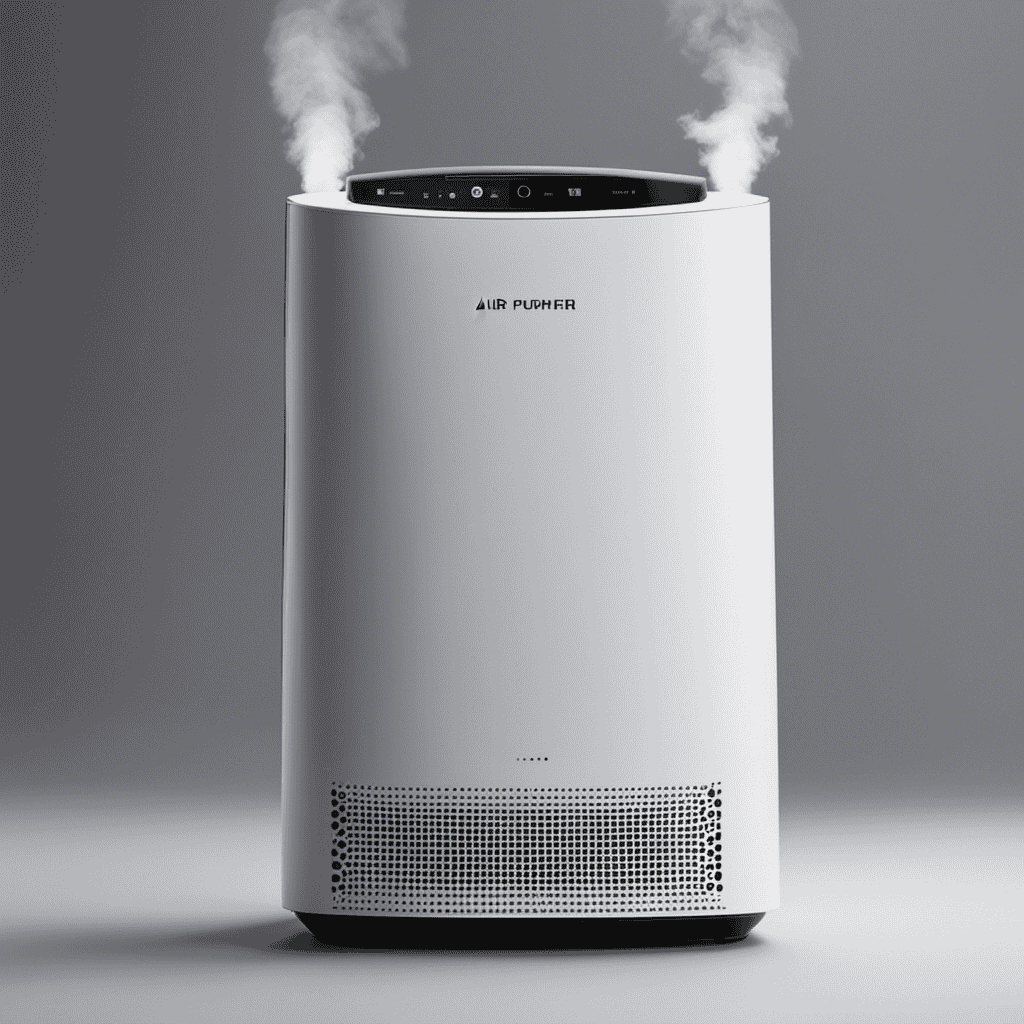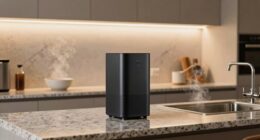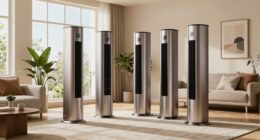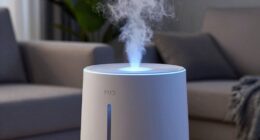As an individual who has battled allergies for a prolonged period, I can confirm the remarkable advantages of possessing a home air purifier.
Picture this: you wake up in the morning, feeling refreshed and ready to take on the day, without the usual sneezing and itchy eyes. That’s the power of an air purifier.
In this article, we will delve into the science behind how air purifiers clean the air, their role in removing allergens, and their impact on respiratory health.
So, let’s dive in and explore what an air purifier can do for you and your home.
Key Takeaways
- Air purifiers use filters to trap and remove airborne particles like dust, allergens, and pollutants.
- Regular maintenance, including cleaning or replacing filters, is essential for optimal performance.
- Air purifiers play a crucial role in removing allergens like pollen, dust mites, pet dander, and mold spores.
- Air purifiers can improve indoor air quality, reduce asthma triggers, and minimize symptoms for asthma sufferers.
How Does an Air Purifier Clean the Air
When you turn on an air purifier, it uses filters to trap and remove airborne particles such as dust, allergens, and pollutants from the air in your home. Air purifiers work by using advanced technology to clean the air.
The filters in an air purifier are designed to capture even the smallest particles, ensuring that the air in your home is as clean as possible. These filters can be made from various materials, such as HEPA filters, activated carbon filters, or electrostatic filters, each with its own unique way of trapping particles.
To maintain the effectiveness of an air purifier, regular maintenance is essential. This includes cleaning or replacing the filters, checking the fan and motor, and ensuring proper ventilation. By properly maintaining your air purifier, you can optimize its performance and ensure that your home’s air remains clean and healthy.
The Role of Air Purifiers in Removing Allergens
To effectively reduce allergens in your indoor environment, an air purifier is a must-have. Air purifiers play a crucial role in removing allergens such as pollen, dust mites, pet dander, and mold spores from the air, helping to alleviate allergy symptoms and improve overall air quality. However, it is important to maintain your air purifier regularly to ensure optimal performance. This includes cleaning or replacing the filters, vacuuming the vents and blades, and checking for any signs of damage or malfunction. Additionally, it is essential to consider the noise levels of the air purifier. Some models can be quite loud, which may be disruptive, especially in bedrooms or offices. When choosing an air purifier, look for one with adjustable fan speeds or a quiet mode to minimize noise levels and ensure a peaceful environment.
| Maintenance Tips | Noise Levels | Benefits |
|---|---|---|
| Clean or replace filters regularly | Choose an air purifier with adjustable fan speeds or quiet modes | Improved indoor air quality |
| Vacuum vents and blades | Check for noise level specifications before purchasing | Alleviation of allergy symptoms |
| Inspect for damage or malfunction | Place the air purifier in an appropriate location to minimize noise disruption | Reduction of pet dander and other allergens |
| Follow manufacturer’s instructions for maintenance and cleaning | Optimal noise levels for peaceful indoor environment | Decreased mold spores and dust mites |
Understanding the Benefits of Air Purifiers for Asthma Sufferers
Understanding the benefits of air purifiers is essential for asthma sufferers. Asthma management is crucial for those who struggle with this chronic respiratory condition, and air purifiers can play a significant role in improving indoor air quality, reducing asthma triggers, and minimizing symptoms.
Air purifiers work by filtering out airborne particles such as dust, pollen, pet dander, and mold spores, which are common triggers for asthma attacks. However, it is important to note that air purifier maintenance is key to ensuring their effectiveness. Regularly cleaning and replacing filters is necessary to keep the purifier running efficiently. Additionally, monitoring the air quality and adjusting the settings accordingly can further optimize the benefits of using an air purifier.
Transitioning to the next section, let’s explore whether air purifiers can also help with pet allergies.
Can Air Purifiers Help With Pet Allergies
Air purifiers can be beneficial for individuals with pet allergies. They filter out allergens like pet dander and reduce symptoms such as sneezing, coughing, and itchy eyes. Air purifiers with HEPA filters are designed to capture and remove these particles, making it easier to breathe. They can also eliminate pet odors, which can be bothersome. For pet owners, having an air purifier provides peace of mind and creates a cleaner and healthier environment for both themselves and their pets. Investing in an air purifier is a practical and effective way to improve indoor air quality and alleviate pet allergy symptoms.
How Air Purifiers Combat Indoor Air Pollution
Air purifiers play a crucial role in combating indoor air pollution. They effectively filter airborne pollutants, capturing and eliminating contaminants such as dust, pet dander, pollen, and harmful gases. These devices have advanced filtration systems that not only remove pollutants but also contribute to improved indoor air quality. This promotes a healthier living environment.
Airborne Pollutant Filtration
An air purifier helps remove harmful particles, like smoke and dust, from the air in your home. It is a device that utilizes advanced technology to effectively improve the air quality indoors.
Here are four key ways in which air purifiers benefit your home:
-
Capture and trap pollutants: Using a combination of filters, air purifiers can capture and trap a wide range of airborne pollutants, including allergens, pet dander, and mold spores.
-
Remove odors: Air purifiers are equipped with activated carbon filters that can effectively eliminate unpleasant odors caused by cooking, pets, or chemicals, leaving your home smelling fresh and clean.
-
Reduce respiratory irritants: By removing harmful particles from the air, air purifiers can help reduce respiratory irritants, such as pollen and fine dust, providing relief for individuals with allergies or asthma.
-
Enhance overall health: Breathing clean air leads to improved health and well-being. Air purifiers can help reduce the risk of respiratory diseases, improve sleep quality, and boost overall immune function.
Improved Indoor Air Quality
To improve the quality of the air you breathe indoors, consider investing in an air purifier.
Indoor air pollutants can have a significant impact on our health, ranging from respiratory issues to allergies and even long-term health problems.
Air purifier technology is designed to combat these indoor air pollutants and provide us with cleaner and healthier air to breathe. These devices work by utilizing various filtration methods, such as HEPA filters and activated carbon filters, to capture and remove pollutants like dust, pollen, pet dander, mold spores, and even volatile organic compounds (VOCs).
The Impact of Air Purifiers on Respiratory Health
Using air purifiers can greatly improve respiratory health by removing harmful particles from the air. As someone who suffers from allergies and asthma, I have experienced firsthand the benefits of having an air purifier at home.
The technology behind these devices is fascinating, as they employ various methods to filter the air and create a cleaner environment. Here are four ways air purifiers benefit respiratory health:
-
Capturing pollen and dust: Air purifiers efficiently trap allergens like pollen and dust, preventing them from circulating in the air and triggering respiratory symptoms.
-
Eliminating pet dander: If you have pets, air purifiers can help remove pet dander, a common allergen that can irritate the respiratory system.
-
Filtering airborne pollutants: Air purifiers can remove pollutants such as smoke, mold spores, and volatile organic compounds (VOCs), reducing the risk of respiratory issues caused by exposure to these substances.
-
Reducing indoor odors: Air purifiers with activated carbon filters can effectively eliminate unpleasant odors, improving the overall air quality and promoting better respiratory health.
Do Air Purifiers Remove Odors and Smoke
When it comes to air purifiers, two important factors to consider are their effectiveness in eliminating odors and their ability to filter out smoke particles.
Odor elimination effectiveness refers to how well an air purifier can remove unpleasant smells from the air, such as pet odors or cooking smells.
Smoke particle filtration, on the other hand, focuses on the purifier’s ability to capture and trap smoke particles, which can be particularly important for individuals who smoke or live in areas with high levels of air pollution.
In this discussion, we will explore the effectiveness of air purifiers in addressing both odor elimination and smoke particle filtration.
Odor Elimination Effectiveness
You can rely on an air purifier to effectively eliminate odors in your home. Here are four reasons why air purifiers are beneficial for odor elimination:
-
Filtering: Air purifiers use filters to trap and remove airborne particles, including odor-causing molecules. These filters can capture even the smallest particles, ensuring that the air in your home is clean and fresh.
-
Activated Carbon: Many air purifiers contain activated carbon filters, which are highly effective at adsorbing odors. The porous structure of activated carbon allows it to trap and hold odor molecules, preventing them from circulating in the air.
-
Ozone Removal: Some air purifiers are equipped with ozone removal technology. Ozone, a common indoor air pollutant, can contribute to unpleasant odors. Air purifiers with ozone removal capabilities help to neutralize these odors, improving the overall air quality.
-
Continuous Maintenance: Regular maintenance of your air purifier is essential for optimal odor elimination. This includes cleaning or replacing the filters as recommended by the manufacturer. By properly maintaining your air purifier, you can ensure its effectiveness in eliminating odors and maintaining clean air in your home.
Smoke Particle Filtration?
One of the key benefits of an air purifier is its ability to effectively filter out smoke particles, ensuring cleaner and fresher indoor air.
Smoke particle elimination is a crucial aspect of air purifier efficiency. This is especially important for individuals who are sensitive to smoke or live in areas prone to wildfires or high pollution levels.
Air purifiers equipped with high-efficiency particulate air (HEPA) filters are particularly effective in trapping and removing smoke particles as small as 0.3 microns. These filters use a combination of physical and electrostatic attraction to capture smoke particles and prevent them from recirculating in the air.
Additionally, some air purifiers employ activated carbon filters that can further enhance smoke particle elimination. These filters adsorb odors and chemicals present in smoke, improving the overall air quality.
Regularly replacing filters is essential to maintain the efficiency of an air purifier in removing smoke particles and ensuring optimal indoor air quality.
Are Air Purifiers Effective in Reducing Dust and Pollen
Air purifiers can be effective in reducing dust and pollen levels at home. Here are four reasons why:
-
Filtration: Air purifiers use filters to capture and trap dust and pollen particles as small as 0.3 microns. These filters are designed to efficiently remove airborne allergens, improving the air quality in your home.
-
Circulation: Air purifiers help circulate the air, preventing dust and pollen from settling on surfaces. By continuously filtering the air, they create a cleaner environment, reducing the amount of dust and pollen particles in the air.
-
Allergen reduction: By removing dust and pollen particles from the air, air purifiers can significantly reduce the presence of allergens. This can provide relief for individuals with allergies or respiratory conditions.
-
Maintenance and cost: While air purifiers require regular filter replacements and cleaning, the cost is relatively low compared to the potential benefits they offer in reducing dust and pollen levels at home.
Choosing the Right Air Purifier for Your Home
In my quest to find the perfect air purifier for my home, I have come across a plethora of options. It’s essential to choose the right air purifier that suits your needs and preferences.
When considering air purifier features, it’s important to assess the size and coverage of the purifier, as well as the type of filters it uses. HEPA filters are highly effective in capturing small particles like dust and pollen. Additionally, look for features like multiple fan speeds, auto mode, and sleep mode for added convenience and energy efficiency.
However, it’s important to remember that air purifier maintenance is crucial for optimal performance. Regularly cleaning and replacing the filters is necessary to ensure the purifier continues to effectively remove pollutants from the air. Some air purifiers also come with filter replacement indicators, making it easier to stay on top of maintenance.
How Does a Whole Home Air Purifier Differ from a Standard Air Purifier for Home Use?
A whole home air purifier differs from a standard air purifier for home use in that it is designed to clean the air in every room of the house. While a standard air purifier is ideal for a single room, a whole home air purifier can provide cleaner air throughout the entire home.
Frequently Asked Questions
Are Air Purifiers Loud and Disruptive When They Are Running?
Yes, air purifiers can be loud and disruptive when running. However, the benefits of using an air purifier, such as improved air quality and reduced allergens, outweigh the temporary inconvenience. Regular air purifier maintenance can also help minimize noise levels.
Can Air Purifiers Help With Mold and Mildew Issues in the Home?
Air purifiers are a great solution for allergies and pet dander. They can also help with mold and mildew issues in the home. I have seen firsthand how they improve air quality and reduce health risks.
How Often Do Air Filters Need to Be Replaced in Air Purifiers?
Air filters in air purifiers need to be replaced regularly to maintain their effectiveness. The frequency of air filter replacement depends on factors such as the type of filter and the level of pollutants in the environment.
Are There Any Potential Health Risks or Side Effects Associated With Using Air Purifiers?
Using air purifiers at home may have potential health risks and side effects. It is important to consider factors such as ozone emissions, noise levels, and proper maintenance to ensure the safe and effective use of air purifiers.
Can Air Purifiers Remove Harmful Chemicals and Vocs (Volatile Organic Compounds) From the Air?
Yes, air purifiers can remove harmful chemicals and VOCs from the air. They work by using filters or other technologies to capture and neutralize these pollutants, making the air cleaner and safer to breathe.
Conclusion
In conclusion, an air purifier is a valuable addition to any home. It effectively cleans the air by removing allergens, combating indoor air pollution, and improving respiratory health.
While some may argue that air purifiers are not effective in reducing dust and pollen, it is important to note that they do significantly reduce these particles. This reduction creates a cleaner and healthier environment.
Imagine coming home to a space free of allergens. You can breathe easily and enjoy a fresh, clean atmosphere. An air purifier can make this a reality for you and your family.



